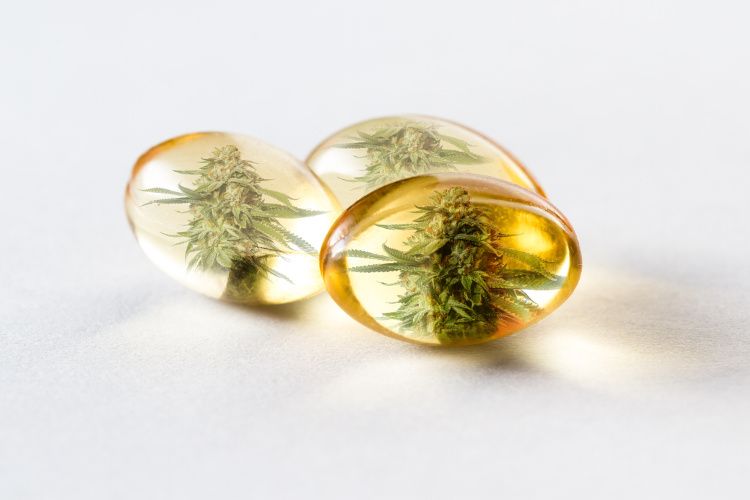The challenges of encapsulating CBD oil products
Like all oils, CBD oils are vulnerable to heat, air, and light that can cause oxidation and alter the efficacy of the oil.
Photo © AdobeStock.com/wollertz

Cannabidiol, better known as CBD, has the ability to remedy several ailments and provide relief in symptoms of chronic pain and anxiety. CBD is one of the many chemical compounds found in the cannabis plants. Over the years, CBD has become extremely popular among people looking for a solution to relieve pain and for several other symptoms, without the psychoactive effect of tetrahydrocannabinol (THC). This growing popularity also stems from several scientific studies that reveal the benefits of CBD products for different conditions. However, there’s a lot that still needs to be studied and proven before widespread claims can be made regarding the effectiveness of CBD in treating disorders and ailments or as a dietary supplement.
Regardless, the use of CBD as a pain killer and in relieving the symptoms of epilepsy and anxiety is gaining momentum. Other potential benefits of CBD include promoting a healthy heart and skin, aiding in sleep, and reducing inflammation.
CBD Oil Capsules
The problem with CBD oil formulations is that-as is the case with most oils-exposure to heat, air, and light can cause oxidation and alter the efficacy of the oil. As with any other type of oil, CBD oil is quite unstable, and delivering it while maintaining maximum potency and ensuring stability is a challenge for CBD oil manufacturers.
Encapsulating CBD oil is a great solution for enabling easy handling of the oil as well as preventing oxidation from heat and light exposure. Although there are different delivery forms available in the market for CBD oil, the benefits associated with CBD oil capsules are:
- Protection from exposure to humidity, light, and air
- Controlled release of CBD oil in the digestive system
- Overcoming undesirable taste and smell
- Easy-to-handle and controlled dosage
Encapsulation is a great way to prevent oxidation, which in turn increases the shelf life of the CBD oil.
The Essentials of Encapsulating CBD Oil
Despite its numerous benefits, encapsulating CBD oil can be tricky. It is important to ensure that the CBD oil capsule manufacturer understands how to handle CBD oil capsule formulations. The capsule material must be food-grade and of high quality, without being overly expensive. The material should enable controlled release of CBD oil in the gut, and it should have emulsifying properties. Additionally, the material should not react with the CBD oil content and should protect it from external environmental factors.
The Challenges of CBD Oil Encapsulation
As mentioned earlier, filling capsules with an oil can be tricky and requires state-of-the-art equipment as well as skilled personnel to carry out the process smoothly. Some of the most critical challenges faced during CBD oil encapsulation are as follows:
1. Getting a consistent dosage of the oil fill
Smooth flow of CBD oil into the capsules while ensuring content uniformity is one of the greatest challenges of encapsulating CBD oil. Not filling the capsules uniformly means that the single, most important benefit of delivering CBD oil in capsules-adequate and uniform dosage-will be compromised. To ensure each capsule is filled with a consistent amount of CBD oil, encapsulation machines need to be highly efficient with a smooth flow of filling.
2. Keeping the capsules clean from oil contamination while filling
Without extreme care, the capsules may become contaminated with the oil during the filling process. The manufacturing team has to exert great caution during the entire encapsulation process to avoid oil spilling and capsule contamination. After the two-piece capsules are filled and banded, they need to be cleaned through specialized processes to maintain quality and ensure that each capsule is clean without any oil on the outer surface.
3. Applying a robust band and curing the band properly
The greatest challenge in encapsulating CBD oil is avoiding potential leakage from occurring during storage or transit. This requires encapsulating CBD oil using high-quality capsule material and applying a robust band and curing it properly. This can only be done with the help of the latest banding machines that band and fuse the capsule together so as to make it look like a one-piece capsule that will not face any leakage issue. Another important factor in dealing with this challenge is ensuring that the CBD oil capsules are properly stored in a controlled environment.
4. Identifying failed capsules and removing them before packaging
Quality control, when dealing with capsules, is very hard and intricate. Each capsule needs to be assessed for quality individually. This is where a diligent quality-control team and cutting-edge testing laboratories come into play. These teams can inspect CBD oil capsules and discard any capsules that do not meet the acceptance criteria. This step is critical because a faulty capsule, if packed and delivered to the customer, can completely deteriorate the CBD oil manufacturer’s reputation.
CBD oil encapsulation is difficult, but with the right manufacturer, businesses can ensure that their customers receive high-quality, standardized capsules that maintain the potency and efficacy of the CBD oil and deliver the proclaimed benefits.
Max Timko is the director of marketing for Ion Labs Inc. (Largo, FL), a contract manufacturer of dietary supplements, OTCs, pet supplements, hemp/CBD supplements, and skincare products. Ion Labs knows exactly how to work around complicated encapsulation and flavor-masking techniques and has extensive experience in pairing functional raw materials without sacrificing any taste.




